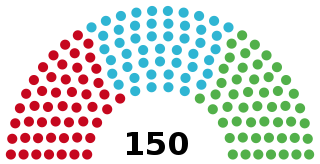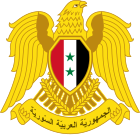
Politics in the Syrian Arab Republic takes place in the framework of a presidential republic with nominal multi-party representation in People's Council under the Ba'athist-dominated National Progressive Front. In practice, Syria is a one-party state where independent parties are outlawed; with a powerful secret police that cracks down on dissidents. Since the 1963 seizure of power by its Military Committee, the Arab Socialist Ba'ath Party has governed Syria as a totalitarian police state. After a period of intra-party strife, Hafez al-Assad gained control of the party following the 1970 coup d'état and his family has dominated the country's politics ever since.

The United Nations Security Council (UNSC) is one of the six principal organs of the United Nations (UN) and is charged with ensuring international peace and security, recommending the admission of new UN members to the General Assembly, and approving any changes to the UN Charter. Its powers as outlined in the United Nations Charter include establishing peacekeeping operations, enacting international sanctions, and authorizing military action. The UNSC is the only UN body with authority to issue resolutions that are binding on member states.

The member states of the United Nations comprise 193 sovereign states. The United Nations (UN) is the world's largest intergovernmental organization. All members have equal representation in the UN General Assembly.

The United Nations Interim Administration Mission in Kosovo (UNMIK) is the officially mandated mission of the United Nations in Kosovo. The UNMIK describes its mandate as being to "help the United Nations Security Council achieve an overall objective, namely, to ensure conditions for a peaceful and normal life for all inhabitants of Kosovo and advance regional stability in the Western Balkans."

The Shebaa Farms, also spelled Sheba'a Farms, is a small strip of land at the intersection of the Lebanese–Syrian border and the Israeli-occupied Golan Heights. The territory is named for the farms within it which were historically tended by the inhabitants of the Lebanese town of Shebaa. It is about 11 kilometres (7 mi) long and 2.5 kilometres (2 mi) wide.
The Taif Agreement, officially known as the National Reconciliation Accord, was reached to provide "the basis for the ending of the civil war and the return to political normalcy in Lebanon". Negotiated in Taif, Saudi Arabia, it was designed to end the 15 year-long Lebanese Civil War, reassert Lebanese government authority in southern Lebanon, which was controlled at the time by the Christian-separatist South Lebanon Army under the occupational hegemony of Israel. Though the agreement set a time frame for withdrawal of Syrian military forces from Lebanon, stipulating that the Syrian occupation end within two years, Syria did not withdraw its forces from the country until 2005. It was signed on 22 October 1989 and ratified by the Lebanese parliament on 5 November, 1989.

The prime minister of Syria is the head of Council of Ministers appointed by the President of the Syrian Arab Republic.
The Constitution of the Republic of Iraq is the fundamental law of Iraq. The first constitution came into force in 1925. The current constitution was adopted on September 18, 2005 by the Transitional National Assembly of Iraq, and confirmed by constitutional referendum, held on October 15, 2005. It was published on December 28, 2005 in the Official Gazette of Iraq, in Arabic original, and thus came into force. An official translation into English for international use was produced in cooperation between Iraqi state authorities and the United Nations' Office for Constitutional Support. Since 2006, several proposals for adoption of various constitutional amendments were initiated. The Kurdish language is official at state level.

The Constitution of Egypt has passed over a long period of evolution from the liberal constitution of 1923 to the contemporary constitution.

United Nations Security Council resolution 1244, adopted on 10 June 1999, after recalling resolutions 1160 (1998), 1199 (1998), 1203 (1998) and 1239 (1999), authorised an international civil and military presence in the Federal Republic of Yugoslavia and established the United Nations Interim Administration Mission in Kosovo (UNMIK). It followed an agreement by Yugoslav President Slobodan Milošević to terms proposed by President of Finland Martti Ahtisaari and former Prime Minister of Russia Viktor Chernomyrdin on 8 June, involving withdrawal of all Yugoslav state forces from Kosovo.
The political status of Kosovo, also known as the Kosovo question, is the subject of a long-running political and territorial dispute between the Serbian government and the Government of Kosovo, stemming from the breakup of Yugoslavia (1991–92) and the ensuing Kosovo War (1998–99). In 1999, the administration of the Autonomous Province of Kosovo and Metohija was handed on an interim basis to the United Nations under the terms of UNSCR 1244 which ended the Kosovo conflict of that year. That resolution reaffirmed the territorial integrity of Serbia over Kosovo but required the UN administration to promote the establishment of 'substantial autonomy and self-government' for Kosovo pending a 'final settlement' for negotiation between the parties.

The Constitution of Kosovo is the supreme law of the Republic of Kosovo, a territory of unresolved political status. Article four of the constitution establishes the rules and separate powers of the three branches of the government. The unicameral Assembly of the Republic exercises the legislative power, the executive branch led by the President and the Prime Minister which are responsible for implementing laws and the judicial system headed by the Supreme Court.

Government of the Syrian Arab Republic is the union government created by the constitution of Syria whereby the president is the head of state and the prime minister is the head of government. Executive power is exercised by the government. Syria has a legislative council with 250 members. The country has been in a civil war since 2011 against various domestic and foreign forces that oppose both the Syrian government and each other, in varying combinations. The seat of the government is located in Damascus, Syria.

The Syrian National Council (SNC) is recognised by 7 UN members, the Republic of Kosovo and the European Union as a legitimate representative of the Syrian people in the midst of the Syrian civil war, with three of those being permanent members of the Security Council. One country, Libya, recognises the SNC as the legitimate government of Syria.

The Syrian peace process is the ensemble of initiatives and plans to resolve the Syrian civil war, which has been ongoing in Syria since 2011 and has spilled beyond its borders. The peace process has been moderated by the Arab League, the UN Special Envoy on Syria, Russia and Western powers. The negotiating parties to end the conflict are typically representatives of the Syrian Ba'athist government and Syrian opposition, while the Autonomous Administration of North and East Syria is usually excluded at the insistence of Turkey. Radical Salafist forces including the Islamic State of Iraq and the Levant have not engaged in any contacts on peaceful resolution to the conflict.

The Vienna peace talks for Syria, as of 14 November 2015 known as the talks of the International Syria Support Group (ISSG), were negotiations of foreign powers that began in Vienna, Austria in October 2015 at the level of foreign ministers, to resolve the conflict in Syria, after unsuccessful previous Syrian peace initiatives.

The United Nations Security Council Resolution 2254 was unanimously adopted on 18 December 2015. It calls for a ceasefire and political settlement in Syria. This document describes the roadmap for Syria's political transition. As of 2023, no real progress has been made to implement the resolution.

The Geneva peace talks on Syria in 2017, also called the Geneva IV, V, VI, VII, & VIII talks, were peace negotiations between the Syrian government and the Syrian opposition under the auspices of the United Nations. The Geneva IV talks took place between 23 February and 3 March 2017, trying to resolve the Syrian Civil War. The Geneva VII talks began on 10 July 2017. The Geneva VIII talks were initially scheduled to begin on 28 November 2017.

The Syrian Constitutional Committee is a United Nations-facilitated constituent assembly process that seeks to reconcile the Syrian Government headed by President Bashar al-Assad and the Syrian opposition, in the context of the Syrian peace process, by amending the current or adopting a new Constitution of Syria. The UN hopes that this would lead to negotiations which would subsequently lead to a peaceful end of the Syrian Civil War, which had been raging for more than eight years by the time of the committee's formation. The Constitutional Committee was formed with the formal approval of both parties involved—namely the Government of the Syrian Arab Republic and the opposition Syrian Negotiations Commission, with the facilitation of the United Nations.

Presidential elections were held in Syria on 26 May 2021, with expatriates able to vote in some embassies abroad on 20 May. The three candidates were incumbent president Bashar al-Assad, Mahmoud Ahmad Marei and Abdullah Sallum Abdullah. The elections were considered not to be free and fair. The United Nations condemned the elections as an illegitimate process with "no mandate"; accusing the Ba'athist regime of undermining UN Resolution 2254 and for obstructing the UN-backed political solution that calls for a "free and fair elections" under international monitoring.


















